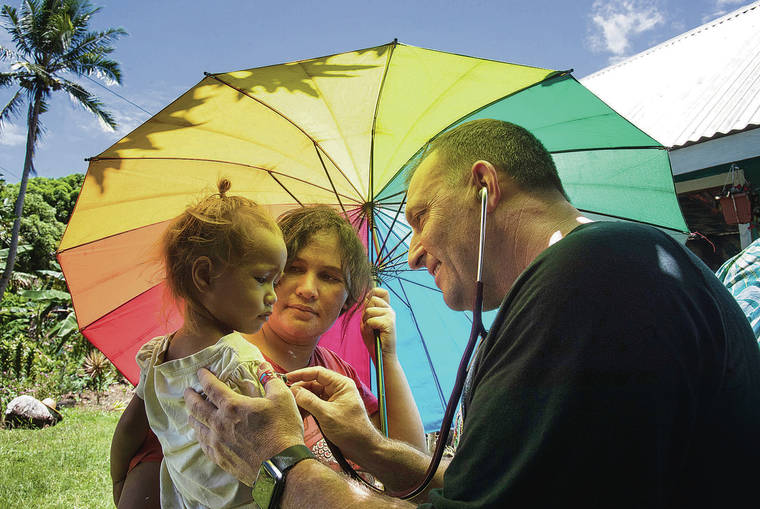APIA, SAMOA >> An 18-month-old baby wrapped in blankets died Wednesday surrounded by family in an exposed concrete cottage in Apia, Samoa, moments before a Hawaii pediatrician came to check on the ailing infant.
Dr. Nadine Tenn Salle, who is part of the Hawaii Health Corps, a group of 76 health care workers who went door-to-door throughout lush villages in the developing independent Samoan nation, said the infant developed pneumonia, a complication of the measles, which is sweeping across the region.
“The baby’s still warm,” Salle said shortly after touching the child and realizing that the baby had just died. “It started out as the measles. Two kinds of complications we’re all scared of is encephalitis, which is the swelling of the brain, and pneumonia. You could see the baby was dry and the eyes were drooped, but I touched the baby while I was looking at her and she’s hot so it never occurred to me. The baby literally died minutes ago.”
The tragic scene is familiar to residents across the region, with the epidemic claiming the lives of at least 60, mostly children, and sickening more than 4,000.
Rasela Mamea, 49, made sure her six children and five grandchildren were all vaccinated.
“I’m so sad because so many people and children are dead,” she said.
“I feel better now,” Mamea added about her family members being vaccinated.
Junior Silva, 28, got the measles vaccine for the first time, after his wife and four young children, ages 7, 5, 3 and 6 months, were immunized last month.
“I was afraid cause I love my children. I don’t want some of my children to die,” said Silva, whose neighbor’s two kids contracted the disease, including a 13-year-old girl who had just been transported to a hospital via ambulance. “Over 60 people lost their lives from this. That’s why we’re trying to protect (ourselves). I’m very worried about my son and my kids, but now I’m so happy to have this. Now I’m safe.”
Galilee Aloiai, 19, was watching his aunt’s banana stand in the village where three people recently died — two babies and one old man.
“It was a sad day,” he said.
>> See our photo gallery of Hawaii health care volunteers in Samoa Opens in a new tab
Still, Aloiai was hesitant to be vaccinated. Immunization rates in the rural country plunged following the deaths of two babies due to tainted vaccines that weren’t prepared properly.
“They (my family) all did (get vaccines). Only me I don’t want to because I can’t believe it. My friend told me that measles is just an old disease,” he said, adding that he was unsure that measles was killing Samoan residents. “It’s kind of confusing.”
His sister, Tina Aloiai, had a different perspective. She had both her 8-year-old daughter and 2-year-old son immunized.
“I feel sad so many people in my country will die,” she said.
Hawaii Lt. Gov. Josh Green, working with government leaders in Samoa, the World Health Organization and the Centers for Disease Control and Prevention, assembled a medical team that included 50 nurses, doctors and other Hawaii health care workers, for the humanitarian effort to vaccinate residents. Green, also a practicing emergency room doctor, said within 24 hours of announcing the medical mission, his office received more than 500 responses from groups and individuals wanting to help.
The independent Samoan government, which is separate from the U.S. territory of American Samoa, is shut down for two days in an effort to control the spread of the infectious disease through the mass immunization campaign. The medical team is hoping to help Samoa reach the goal of vaccinating 50,000 people during a 48-hour mission.
With bloodshot eyes and fever, 7-year-old Fufiva Siaose began to show signs of the measles today.
“This little guy he’s got the first days of measles. It’s going to be OK we hope,” Green said, while visiting Siaose’s home in Apia. “The rash will come in a couple days, but we’re going make sure he gets checked up again tomorrow and the next day so he’s OK. That’s the plan.”
There is no treatment or antibiotics for the measles besides lots of fluids and medicine to keep the fever down.
“There’s no direct treatment for the measles so we have to make sure that he doesn’t get any of the complications,” Green said. “Keep a close eye on him is the main thing, and if God forbid they get worse, we give them intravenous fluids and make sure that we don’t see any of the really bad stuff. Because there’s so much measles and so many sick children right now we’re pretty intent on making sure there’s close follow-up.”








